One Year with Fozzie
Some fragmented thoughts on the lessons of welcoming a shelter dog, a ramen-noodle bowl, and songs for the journey
Thursday, April 29
Grand Rapids, Michigan
Greetings, dear reader.
Like many other people, I took up looking at pictures of shelter dogs as a pandemic hobby. I spent hours scrolling through dog photos on Petfinder—chihuahua, pit bull, chihuahua, pit bull, chihuahua mix, pit bull mix. Late last March, a serious-faced dog with pleading eyes stopped me. The description said, “Senior.” He was living at a shelter in northern Indiana. His name was Fozzie.
I texted Fozzie’s photo to some dog-loving people in our lives.
My friend Wes replied: “Oh Fozzie looks like such a friend.”
After some conversations with Tristan, I sent the shelter an inquiry. The reply was a medical report: low thyroid, mostly deaf, chronic ear and eye infections, allergies. He was on multiple medications. He needed therapeutic baths. He’d been living as a stray, fleas and ticks his closest companions. “He was pretty sick,” his foster said. “I wasn’t sure he was going to make it.” She added that he’d been at the shelter for months, but nobody had expressed interest in him.
Any normal person would have ended the exchange right there. Thoughts and prayers for Fozzie! Instead, a few weeks later, we drove to Indiana to meet him.
When he came into the waiting room, Fozzie was friendly but reserved. He trotted up to say hello but didn’t show too much interest. Here was a dog after my own heart! When he turned around, we saw evidence of life’s toll. His rear end was nearly hairless; where white fur should have been, there was bare skin, much of it red and raw. His tail and part of his back were mostly bald. He had thick layers of scar tissue.
We asked about his name. “You can change it if you want,” his foster said. “He can’t hear you anyway.” She told us he was 93% deaf—a precise measurement that has always baffled us. Their best guesstimate, based on his teeth, was that he was 10 years old. But maybe he was 8 or 12. Who could know?
Sensing our reticence, she added that they offered a heavily discounted adoption rate for senior dogs. And we could foster him for a trial month—no commitment necessary. The shelter would provide all we needed: food, medication, bed, bowls, toys.
Ten days later, after he’d visited the vet once more, we returned to Indiana to bring Fozzie back with us to Grand Rapids. He spent the entire two-hour ride on my lap.
That was one year ago last week. Fozzie is still with us, so you can figure out how that foster thing went.
From the start, it was clear he had problems. He feared the stairs—and still does. He doesn’t know how to play with toys. We spent way too much on dental work for him—and that was after we rejected root canals, which would have cost $3,000. !!!! He’s scared of motorcycles and some bikes but has no regard for cars; he’ll just happily wander into the middle of the street. He still isn’t sure which side of the front door opens, even though he goes through that door multiple times a day—his magic portal to the land of poop and pee and play with his friend Molly, who lives two doors down.
Yet all he has to do is to sit by my desk, fix his eyes on me, and catch my attention with a whimper: Everything is forgiven, and my pathetic heart goes puddle-like.
Yes, Fozzie, I will give you all the treats in the whole world.
It turns out there is something scientific going on there—and my response to Fozzie is as animalistic as his behavior is.
A couple of years ago, when I interviewed the German animal behaviorist Christian Nawroth, we discussed how domesticated animals deploy their cuteness strategically. “Huge head, huge eyes, fluffiness—nature uses these baby features to protect the creatures,” he explained. “Because they are so cute, so adorable.”
Just as the adorability of human babies draws us not just to ooh and aah at them but also to care for them, the Austrian zoologist Konrad Lorenz posited that animal evolution selected for features that humans find cute, endearing, nonthreatening, and even a bit needy. He dubbed this phenomenon kindchenschema, from “kindchen,” a German word for “child.” (You’ll also sometimes see it referred to as kinderschema.)
A dog, of course, is not a child. Please never refer to Fozzie as my “fur baby”: A dog is a dog. And Nawroth cautioned me against overestimating animals’ abilities. We don’t live in Lake Wobegon, and just as every child is not above-average, neither is every dog. “We have no idea what is going on in their inner life,” Nawroth said to me with a sigh. “Dogs have been hyped as being so special, but they are actually not so clever. They can read humans really well and they can respond appropriately. But pushing them into the realm of the ‘super-clever’ might be counterproductive.”
What I heard Nawroth suggesting was that we shouldn’t try too hard to read human traits and motivations into the behavior of non-human creatures. In other words, what if we just let dogs be dogs?
In her essay “The Summer Beach,” from her book Dog Songs, Mary Oliver reflects on the dog as animal. She muses on a remnant of its pre-domesticated life, perceptible when a dog is unleashed. Then, we see in a canine’s character “the wilderness out of which he cannot step entirely, and from which we benefit.” Even if we wish to deny it, with all our talk of progress and civilization, Oliver reminds us, “Wilderness is our first home too, and in our wild ride into modernity with all its concerns and problems we need also all the good attachments to that origin that we can keep or restore. Dog is one of the messengers of that rich and still magical first world.”
Last November, we took Fozzie to the beach and let him off-leash, something we never do when we’re walking in town. On the sand, he ran and ran and ran, ears thrown back by the breeze. He even raced me, which he never does when there’s pavement underfoot. “The dog would remind us of the pleasures of the body with its graceful physicality, and the acuity and rapture of the senses,” Oliver writes. “There is not a dog that romps and runs but we learn from him.”
I’ve learned so much from Fozzie. Though he usually seems like a sober, old character, he seems silly and young when he wrestles and frolics with Molly; then I think about my own sense of play, which usually stays well-buried under my self-seriousness. If he glimpses a rabbit, he explodes with a born hunter’s delight—and that sense of abandon makes me think about the rare moments when I break my own careful shell. He wants to go for a walk every couple of hours—more often when it’s warm and sunny outside; he reminds me to move more of my body than my fingers.
Yes, and: What if we saw dogs as dogs, and not just as avatars for human emotion or unwitting teachers or facilitators of our own understanding?
Yes, and: I want to believe that Fozzie’s flourishing isn’t just about our own learning or our own delight. Our hope is that he’ll have the space and nourishment to be the Fozziest version of Fozzie. I want him to run on the beach not just so that I’ll get an Instagrammable photo but because it makes him happy to stretch his old legs. Isn’t love about wanting his days to be filled with goodness and his nights to be rich in peace, not for our sake but for his own?
Yes, and: “We just want to give him a good life,” Tristan said, not long after we brought Fozzie home.
Yes, and: I guess we’ll just keep giving him treats.
What I’m Cooking: On Tuesday, I was pretty grumpy. For dinner, I wanted comfort food, and something quick and easy. It was an unseasonably warm, humid day, and hot soup sounded terrible. I thought about the cold and room-temp noodle dishes served in much of East Asia, and I thought, Hmm... maybe we could do some version of that.
My basic equation: noodles as a base, some kind of stir-fried vegetable, some kind of flavorful meat, and an egg on top. I grabbed a couple of packets of Shin ramen, cooked them until just done, and then drained the noodles and ran them under cold water. I quickly sautéed bok choy with minced garlic. I chopped up the meat from some leftover ribs from Franklin Barbecue in Austin—please don’t ask how long they’d been in the freezer—warming it gently in a pan with a splash of water. (You could use rotisserie chicken or leftover roast beef or even Spam; just make sure it’s not bland.) While the meat warmed, I poached two eggs in water seasoned with soy sauce; bring the liquid to a boil, crack the eggs in, cover, take the pot off the heat, and let sit for five minutes.
The noodles went into the bottom of a big bowl, topped with a drizzle of soy sauce and a sprinkle of sesame oil. Then the bok choy and meat. Then the egg atop that, with some scallion and a sprinkling of shichimi togarashi, the Japanese spice blend. If you haven’t got shichimi togarashi, you could do a squirt of sriracha—or just a really good dousing of salt and freshly ground black pepper. The runny yolk helps make a bit of a sauce as you stir everything around. Dinner was done in twenty minutes.
What I’m Listening to: This week, I spent some time with “Kahrin,” the eponymous album by the singer-songwriter Kahrin. Her songs explore heartbreak, wrestling with God, chasing love, vulnerability. Probably because I’ve been working on some projects that have been difficult emotionally, the track that has been speaking most (singing most?) to me is called “Onward Then.” “I know you’re scared/ I know it hurts/ But my love, just one step forward,” she sings. “So go out and take some chances/ And trust in love no matter/ What the outcome is/ Onward then....” It’s the exhortation I’ve needed.
What I’m Reading: A postwar love story from the Los Angeles Times. Such resilience. Such perseverance. Such beauty. Such love.
You can follow Fozzie on Instagram at @fozziefozz!
That’s it for this week. May you glimpse goodness in your corner of the world. God knows we need it. Tell me where you’re finding hope this week. Or tell me about your dog. Or maybe those two are the same thing.
I’m so glad we can stumble through all this together, and I’ll try to write again soon.
With gratitude,
Jeff

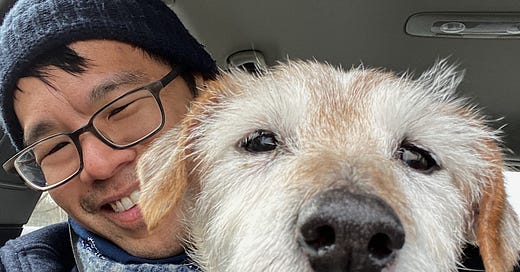


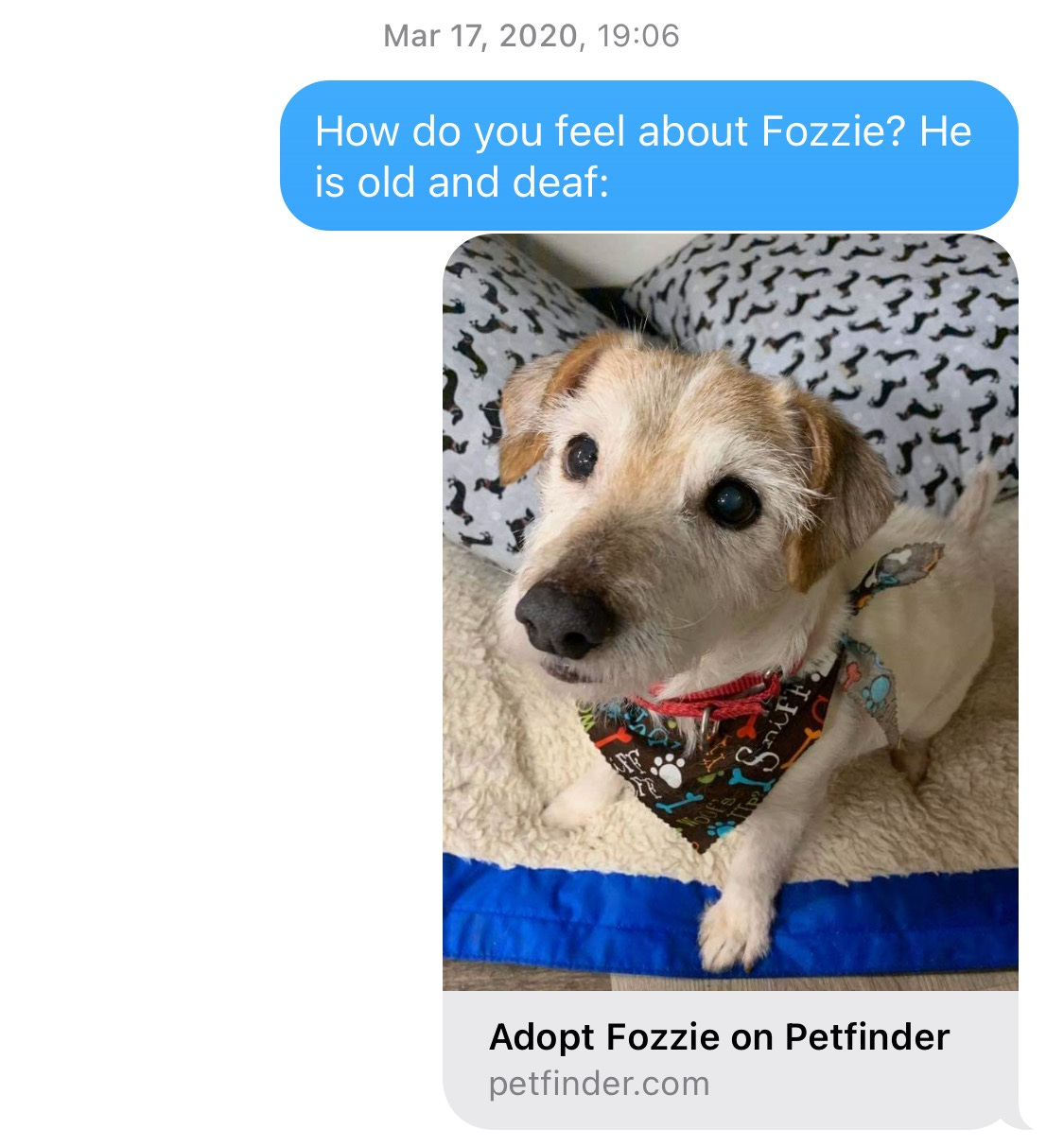

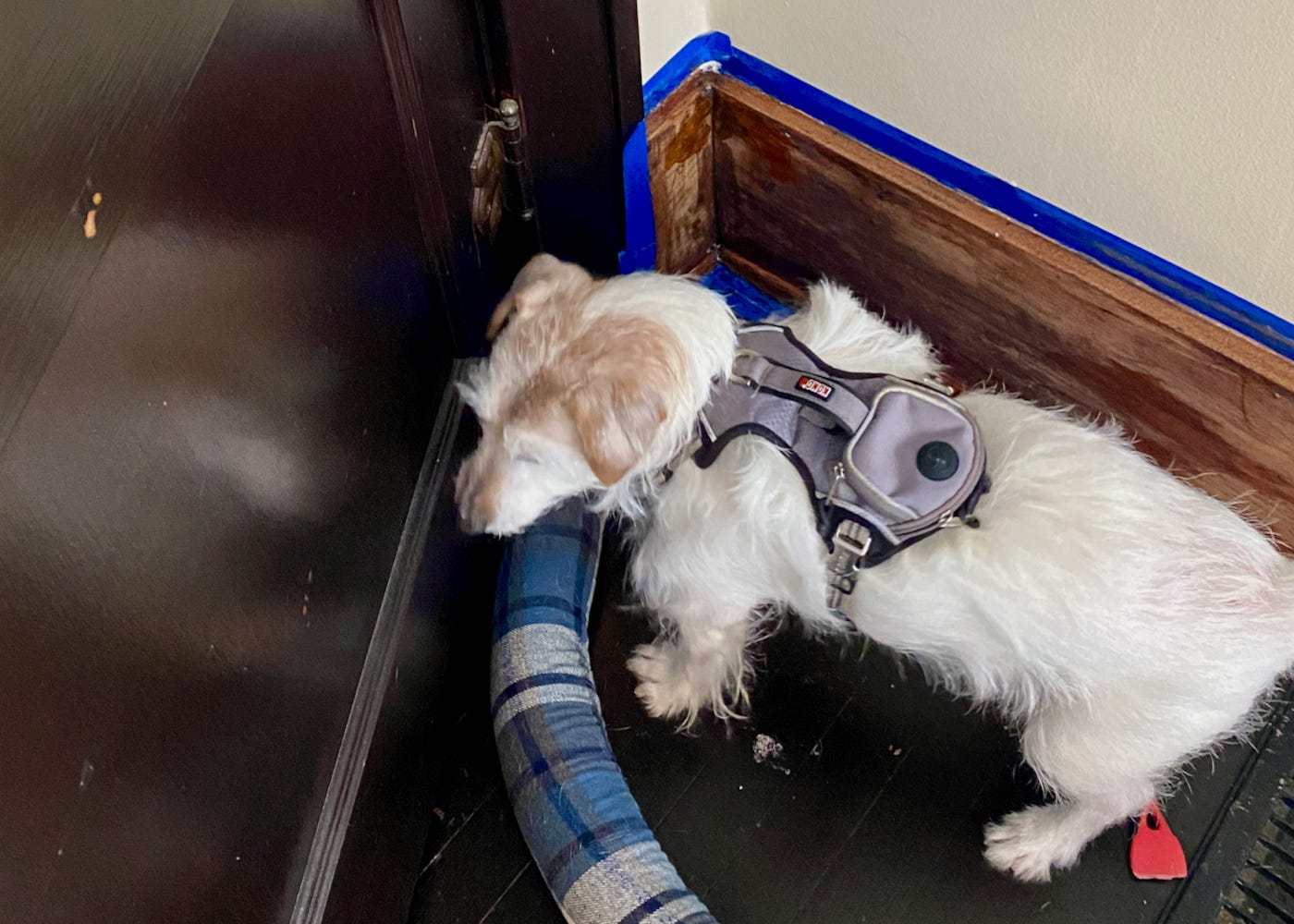
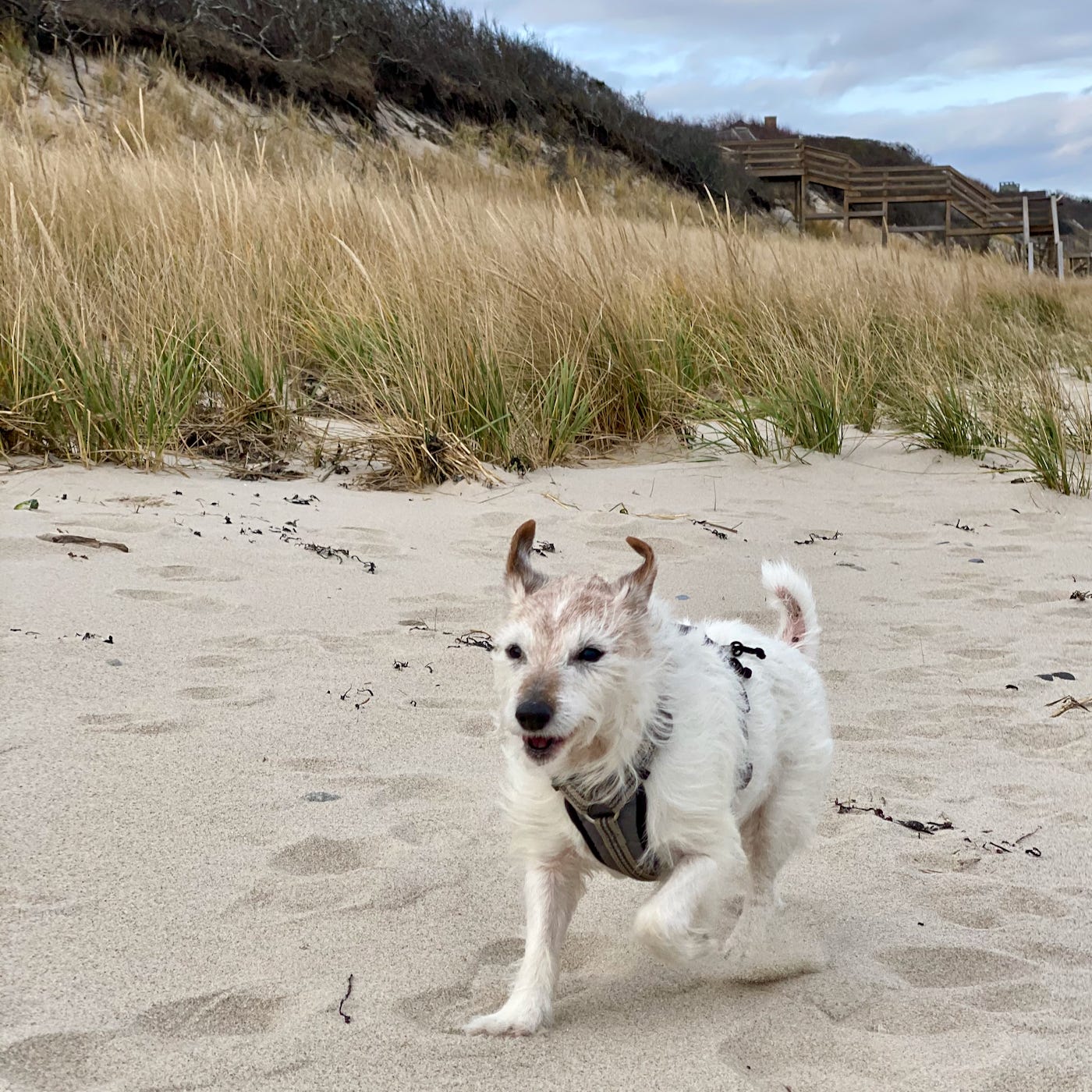
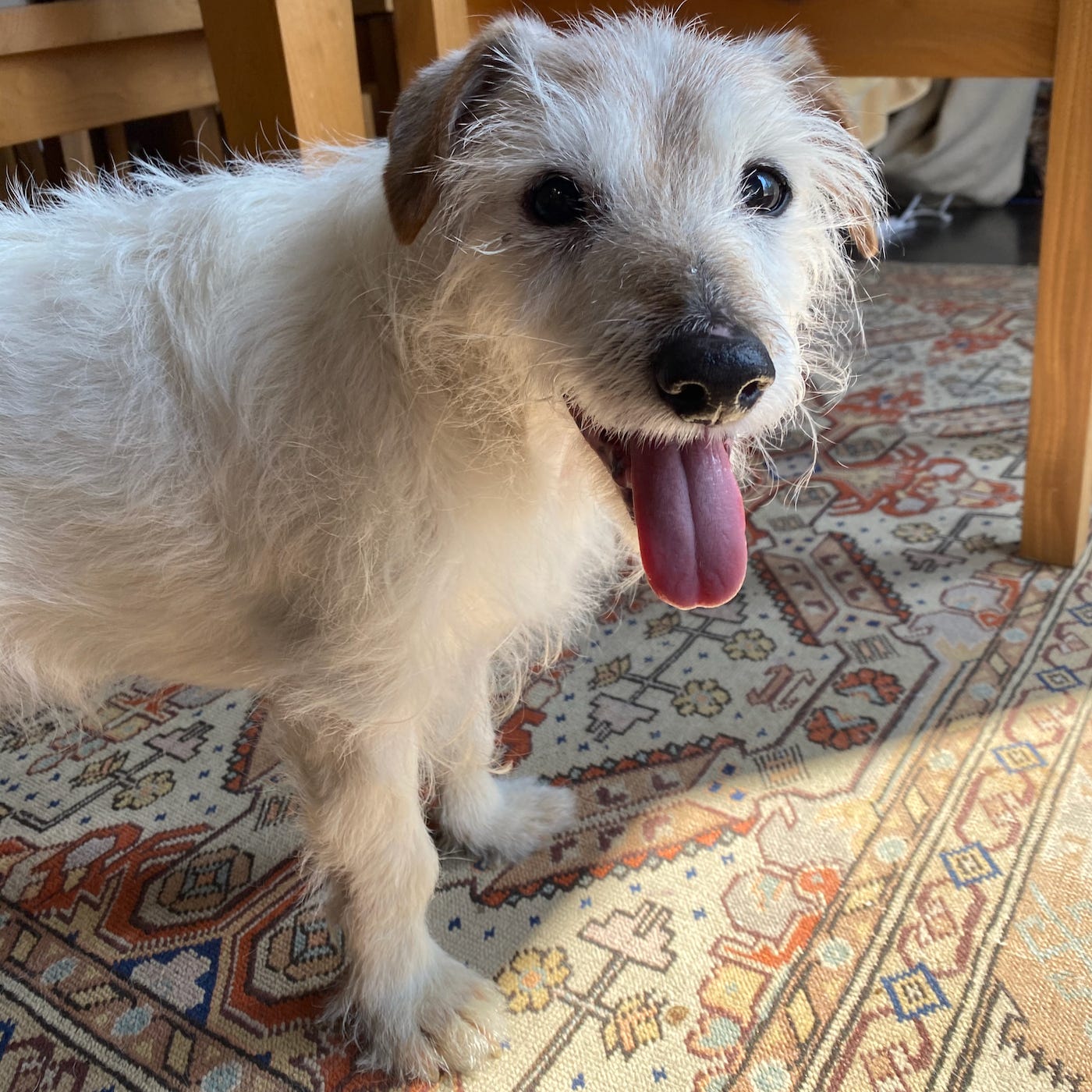
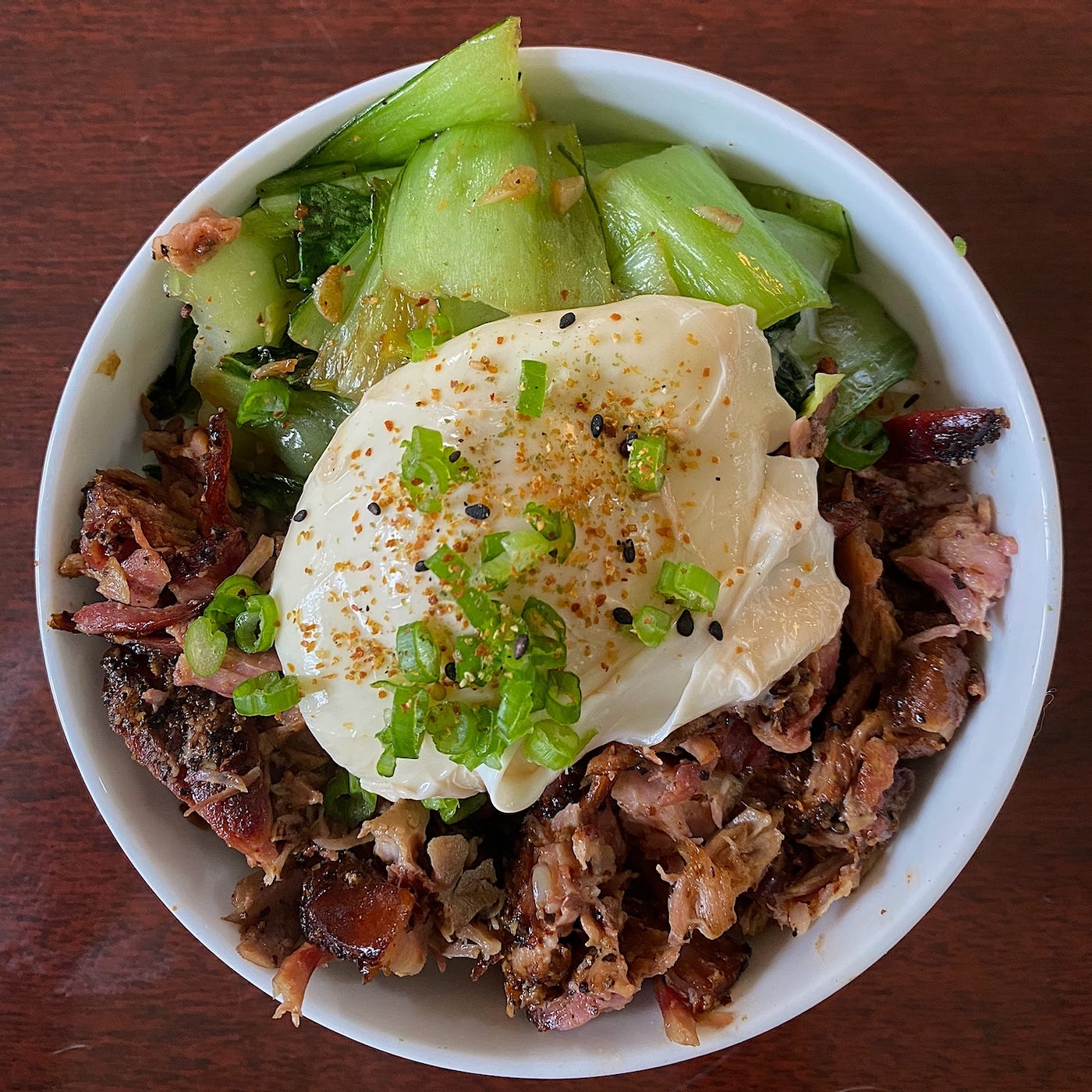
It must also be said: dogs are not grandchildren.
Your love of Fozzie inspired me today
Reading about giving him a good life got me thinking about how I treat my parents and I've been trying to think of how to better love them as they are fox news and all. Who knew your story would do that ?! You inspire me Jeff to do better.